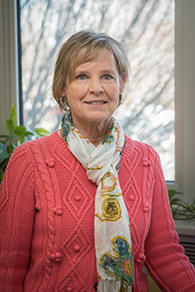Can we talk: Suggestions for young adults on how to assist aging loved ones
Tuesday, May 30, 2017
MANHATTAN — The secret for adult children who want to advise their aging parents is to "suggest, rather than tell," according to Gayle Doll, associate professor of human ecology and director of Kansas State University's Center on Aging.
"You can't force your parents to change their lifestyles or tell them what they should be doing, but you can find resources and present options," Doll said.
It is often easier for younger adults, who may be more involved in community networks and savvier online, to find resources for older adults like social groups, exercise classes and support offices, Doll said. Younger adults can then present the options to their older loved ones and help them determine which resources would be most appropriate.
"People can visit with their older parents and say, 'I notice there's an array of activities for people your age in your town; did you know all this?'" Doll said. "If they say no, it gives the person the opportunity to share about the activities and how to get involved."
In addition to suggesting options, Doll said younger adults can assist their older loved ones by accompanying them to the activities or locations the first several times rather than sending the older adult off to try it alone. For example, if an older adult agrees that it would be beneficial for them to attend a water exercise class, they may have several uncertainties, like where to park, pay, change clothes and find a towel. If someone they know and trust guides them through the steps, the older adult is more likely to begin and stick with the program, Doll said.
"Going somewhere new and going through all the steps to make something happen can be frightening even for a younger person, and it's magnified for older adults who have become accustomed to routines and locations they are comfortable with," Doll said.
The concept of doing things together can also be used for simple activities like walking or doing brain-strengthening games such as crossword puzzles.
"Sometimes, the younger adult can say, 'I've decided I need more walking; would you go with me, Mom?'" Doll said. "There are ways of making it happen, but ultimately, it needs to be their decision."

